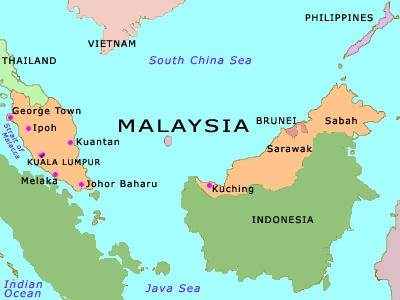Guarded enclaves rekindle communal living in Kuala Lumpur
 Kuala Lumpur - Living in the bustling Malaysian capital of Kuala Lumpur can often be a lonely - and in recent years even dangerous - existence as many families lead lives far apart from those of their neighbours.
Kuala Lumpur - Living in the bustling Malaysian capital of Kuala Lumpur can often be a lonely - and in recent years even dangerous - existence as many families lead lives far apart from those of their neighbours.
But in the past few years, a rise in crime and particularly in burglaries has forced many Malaysian neighbourhoods to resort to the benefits of a close-knit community, but with a modern twist.
From resort-style guarded communities, to hiring private security surveillance in residential areas, the concept of a secured housing area has grown in popularity.
According to government statistics, total reported criminal activity in 2007 came to 209,559 cases, a surge of more than 33 per cent from 2005. More than 16 per cent were house burglaries.
From January to June this year, a total of 18,005 house break-ins have been reported, but 30 per cent of the cases have been solved, police records show.
In response to rising crime rates and complaints of lacking police efficiency, security is now the number one priority for property buyers.
Residents of neighbourhoods without gates and other security features are now pooling money and employing private security companies.
Along with around-the-clock security patrols, many of these even come with make-shift barricades and custom-made car stickers to distinguish residents from outsiders.
Whether these measures have indeed lowered crime rate is debatable, but it has resulted in a growing sense of community in the guarded enclaves.
"Employing the services of a security watch is not just for safety's sake, but is also to foster a sense of community living," said William Chan, president of a residents' association in a middle-class suburb encompassing more than 1,400 homes.
Since hiring the security company in 2005, participation in community projects and festive gatherings has risen, Chan said.
"I suppose because we all have a share in employing the guards, there is a sense of solidarity and some neighbourliness," he said.
But the security and camaraderie comes at a price - homeowners have to pay anything from 30 ringgit (9 dollars) to 1,000 ringgit (303 dollars) a month, depending on the area and level of security.
"Charges are based on the number of security guards needed, and if it's a 24-hour or 12-hour patrol job," said a spokesman for Progressive Security, a guard-and-patrol service provider in Kuala Lumpur.
"Over the years, clients are more willing to pay higher premiums to ensure greater security," he said.
"It's a small price to pay, and it really makes a difference," said Tan Jek Hui, an IT consultant living in another secured residence in the central Selangor state.
"The only problem is free-riders - people living within the same community who refuse to pay their share," he said.
Critics of this new trend say the concept gives residents a false sense of security, as guards have neither authority nor training to arrest suspected criminals.
"Safeguarding the people is the job of the police, and as long as we take it in our own hands, the authorities are not going to buck up," said a homeowner who requested anonymity.
But only a silent minority puts up such opposition, as evident in the number of new developments being marketed as gated communities within and around Kuala Lumpur.
"The concept of a guarded residential area brings with it a touch of exclusivity and affluence, and sense of community," said Moses Wong, a property observer.
"It's like living in a modern, urban home with the closeness of a rural community," he said, adding, "Of course, the difference is having someone else to look out for the neighbours." (dpa)